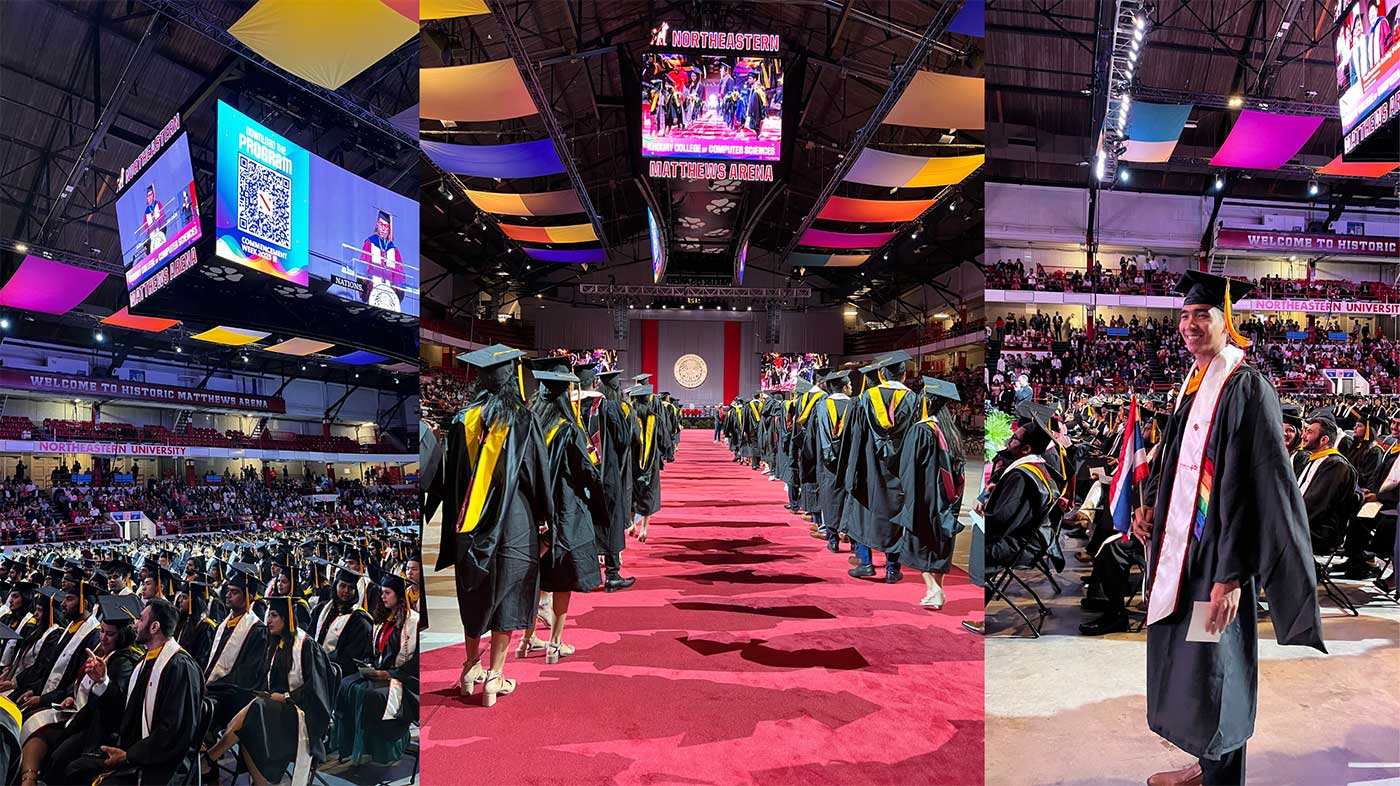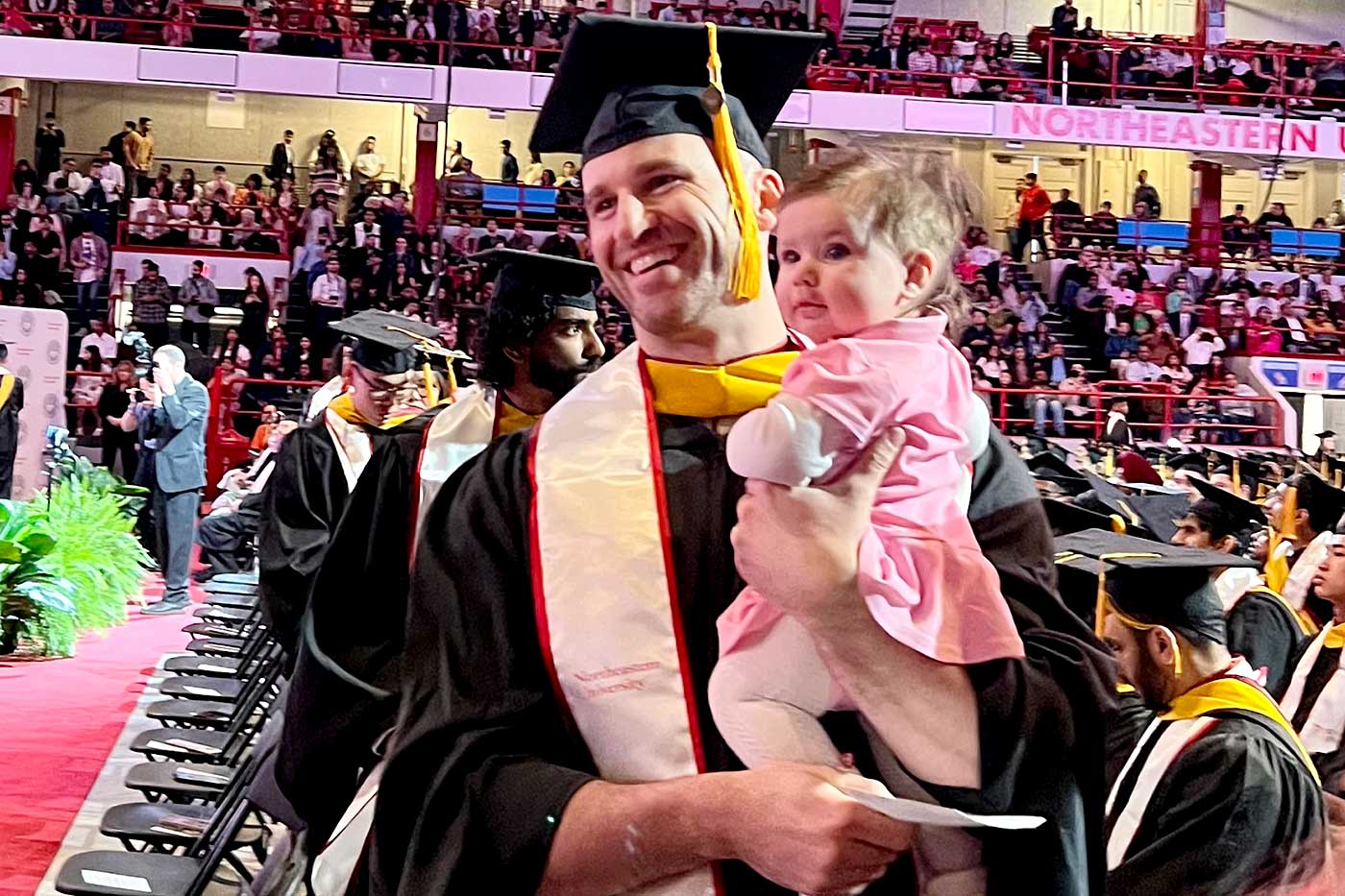Possibility and responsibility carry the day at Khoury College Commencement 2023
Author: Milton Posner
Date: 05.10.23
 Photos by Margaret Miley and Despina Apostolska.
Photos by Margaret Miley and Despina Apostolska.
Both undergraduate student speaker Sanjana Mishra and Dean Elizabeth Mynatt wanted to be perfectly clear: they, not AI, wrote the speeches they delivered for Khoury College’s commencement ceremonies held Saturday at Matthews Arena. Undergraduate keynote speaker Rich Miner accepted assistance from a bot in framing his speech, but said he rejected its jokes.
Despite the jest with which the trio floated their remarks, the banner-headline potential of generative AI was one of several arrows pointing to the key theme of the festivities: how can computer science be leveraged to benefit society? In the graduate ceremony held in the morning, then again in the afternoon undergraduate ceremony, Mynatt and the speakers posed those questions and more, charging the graduates to think not just of the achievement they’d earned, but of the opportunity that awaits them and responsibility they now bear.
Graduate ceremony
“You are entering the field of computer science at an exciting time. You are also entering at a time when we, as a society, are grappling with some difficult questions regarding our personal privacy and the technologies under our charge,” Mynatt reminded the graduates, citing ChatGPT, driverless cars, and personal-data-heavy advertising algorithms as ethical thickets. “I am confident that your education at Khoury College has provided you with the knowledge, tools, experiences, and conviction to tackle these thorny issues … I ask you to remain resolute in the belief that computer science is for everyone, and that everyone should benefit from computer science.”
To that end, Mynatt returned to the computer scientist’s oath she debuted at last year’s commencement — a seven-point guide to ethical conduct modeled after those taken by medical professionals and engineers upon entering their respective fields. This year, students recited the oath for the first time, pledging to respect the dignity, privacy, and diversity of all those touched by technology.
“Computing technology is rarely neutral due to how deeply computing is ingrained in our society,” Mynatt added. “It is imperative that we harness what we learn and discover to better the world we inhabit.”
But societal responsibility was far from the only charge to the class of 1,076 master’s students, 41 percent of whom were female. Mani Sundaram, the graduate ceremony’s keynote speaker and an executive vice president at cloud computing company Akamai, brought the perspective of his own career, which he began after graduating Northeastern with his computer science master’s in 1999. At that time, the internet boom was opening countless new jobs for computing graduates, and between his programming, managerial, and startup roles, Sundaram discovered the value of a strong technical foundation and close collaboration with users.
“I can’t think of a better learning environment than a startup where you learn to wear different hats every day,” Sundaram said. “It’s a great way to learn soft skills such as handling stressful situations, motivating employees, and juggling multiple responsibilities.”
READ: Mani Sundaram receives 40 for 40 honor
He also noted the importance of community, and not just as an end unto itself.
“The hours you spent studying have paid off and will continue to pay off, but the time you spent with your classmates as a member of this international community will also serve you extremely well as you take on your roles as next-generation computer scientists,” Sundaram noted. “Keep those connections and keep making more, because it’s that perspective that will help you understand what this internet of people needs from you today.”
That sense of community also marked the speech of student speaker Alanna Pasco, who graduated from the Align program after also earning her undergraduate degree from Northeastern.
“We are a network, and in non-technical terms, that’s a community,” Pasco reminded her fellow graduates, before shouting out her fellow first-generation college graduates. “Nothing could have prepared me for the relief that flooded my body when I saw for the first time that I was not alone in my struggles navigating the first-gen college experience. That relief gave me conviction that I belonged.”

Undergraduate Ceremony
Some elements remained the same in the afternoon ceremony, including Mynatt’s social responsibility charge and the graduates’ taking of the oath. But a few differences stood out, none more so than the inclusion of Android co-founder Rich Miner, who delivered his speech from — in all likelihood — the same spot where his grandfather, an immigrant and first-generation college student, graduated from Northeastern in 1930.
“You are graduating at a unique moment when generative AI is propelling your chosen field to unprecedented heights,” Miner told the 666 graduates, who represented more than 70 countries and dozens of combined majors. “I’ve spent four decades observing the ebb and flow of technological cycles, and this one is different. It’s a perfect storm.”
So as computers become more adept at talking to us in the languages we use among ourselves, Miner prescribed bold vision and strong community as essential for what comes next.
“Surround yourself with inspiring people who share your passions. Never stop looking, learning, and adapting, so that you’ll see opportunities as they start to emerge,” he advised. “And especially while you’re young, take risks.”
Undergraduate speaker Sanjana Mishra staked her speech on risk-taking as well, but did so using Ratatouille and the f-word. Yes, that Ratatouille. And no, not that f-word.
In recalling Chef Gusteau’s quote, “You must try things that may not work … your only limit is your soul,” Mishra said she was reminded that cooking and coding aren’t too different. “They both require a pinch of creativity, a dash of experimentation, and a healthy serving of patience,” she said.
That philosophy, she noted, meant that the f-word (failure) was an evitable growing pain.
“Khoury College was not a cakewalk. We were challenged and tested — not unlike the code we were writing — and pushed to do better than our best. And we stand here before you as the graduating class of 2023 because we took these failures in stride,” Mishra said. “Thank you, Khoury administration and faculty, for teaching us to be creative and imaginative problem-solvers with soul, and for teaching us that it’s okay to try things that may not work.”
That effort and problem-solving built communities, which, as fellow undergraduate speaker Blake Heyman noted, deepened even as students forged their own academic paths.
“I feel so lucky that I got to experience the depth, richness, and warmth of connection through the communities I found at Khoury College,” Heyman professed, citing his experiences as a leader of Out in STEM and as a member of the student-run software consultancy Sandbox. “I wasn’t just coding networks; I created them for myself.”
And as Heyman and his fellow graduates prepare for their professional pursuits, Mynatt is confident those networks will extend the Khoury experience into lifelong pathways.
“I have seen how supportive our students are of one another, and I hope you continue to nurture the connections you have made here,” Mynatt said. “I wish all of today’s graduates good health, professional success, and a sense of purpose and joy as you take your Khoury degree into the world and make a difference in the path you choose.”